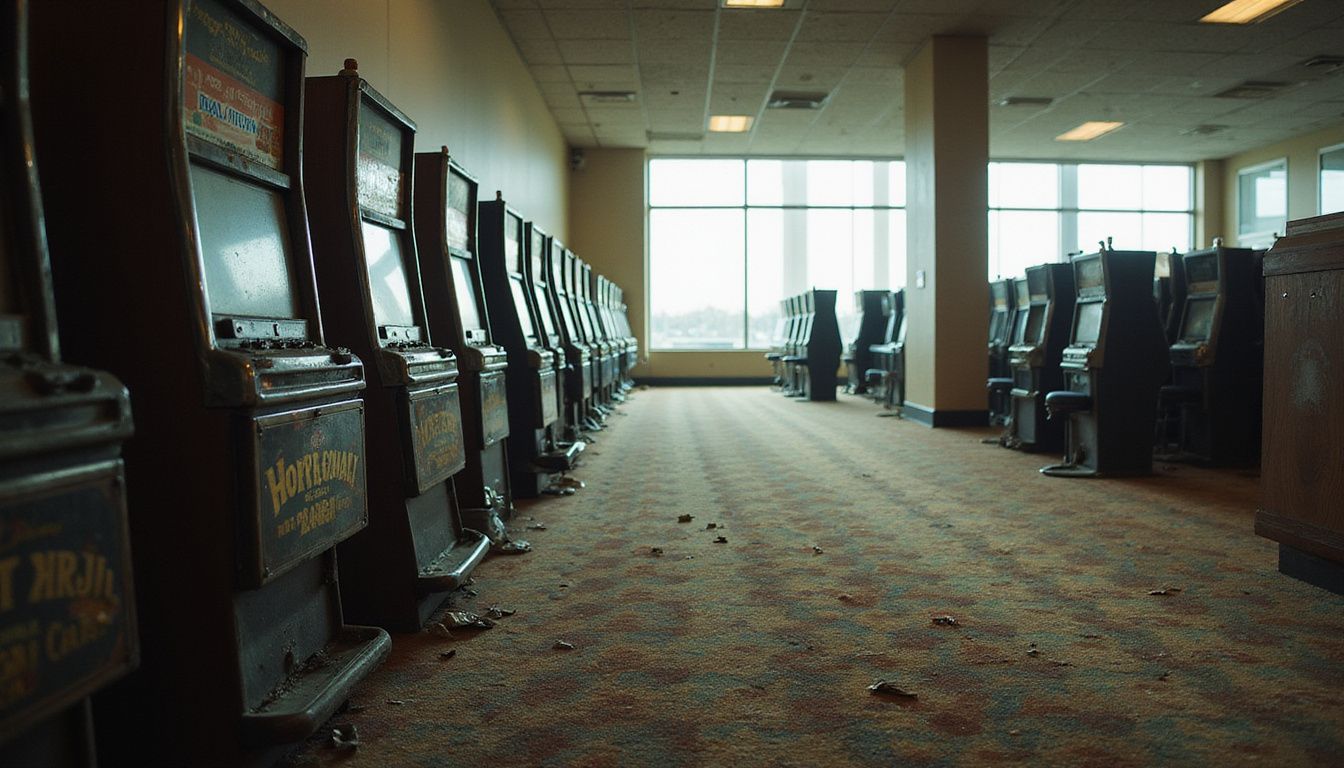
Do you worry about a loved one who can’t stop gambling? Maybe you’ve noticed your own betting habits getting out of control. Spotting the signs of gambling addiction help comes first in the recovery journey.
What starts as fun can quickly turn into a serious problem that affects money, relationships, and mental health.
Gambling addiction works much like dependence on drugs or alcohol. It changes brain chemistry and creates powerful urges that are hard to resist. This blog will guide you through the warning signs of problem gambling and practical steps toward recovery.
You’ll learn about therapy options, support groups, and resources for both gamblers and their families. Recovery is possible.
Flesch-Kincaid Grade Level: 7.8
What is Gambling Addiction?

Now that we understand the basics, let’s explore gambling addiction more deeply. Gambling addiction is a serious psychological disorder where a person cannot control their urge to gamble.
This condition, also called compulsive gambling or gambling disorder, works much like drug or alcohol addiction in the brain. People with this problem continue to bet money despite harmful effects on their lives.
The urge to gamble becomes so strong that it takes over their thoughts and actions.
Gambling addiction progresses over time, often starting as casual entertainment before growing into a harmful habit. The person feels restless or irritable when trying to cut back and often lies to hide their betting activities.
They may chase losses by gambling more to win back money, creating a dangerous cycle. This disorder affects all parts of life, including relationships, work, and financial stability.
Many people with gambling problems also struggle with other mental health conditions, making treatment more complex but still possible through proper support.
Signs of Gambling Addiction
Gambling addiction shows itself through clear warning signs that often go unnoticed at first. These signs range from mental fixation on betting to serious money troubles that affect daily life.
Preoccupation with gambling
People with gambling addiction spend most of their time thinking about gambling. Their minds fill with thoughts of past wins, future bets, or ways to get money for gambling. This mental focus becomes so strong that it pushes aside other important parts of life.
A person might miss family events, skip work, or lose interest in hobbies they once enjoyed. This constant mental focus on betting is a key sign of problem gambling. The brain becomes rewired to crave the thrill and excitement of placing wagers, similar to how substance use disorders affect brain chemistry.
The preoccupation often leads to restlessness or irritability when trying to cut down on gambling activities. Someone might try to hide how much they think about gambling from loved ones.
They may grow defensive when questioned about their habits. This obsessive thinking pattern marks the difference between casual betting and compulsive gambling. As this fixation grows stronger, the person might need to place larger bets to feel the same excitement, showing how gambling disorder progresses over time.
Financial problems often follow as the person chases losses in hopes of winning back money.
Chasing losses
Beyond constant thoughts about gambling, a major red flag appears when gamblers chase losses. This behavior happens after losing money, when a person keeps betting more to win back what they lost.
The gambler thinks, “Just one more bet will fix everything.” This desperate cycle often leads to bigger losses and deeper financial trouble.
Chasing losses is like digging yourself into a hole and thinking the only way out is to keep digging deeper.
Chasing losses shows how gambling addiction works like drug addiction. The brain gets stuck in a reward loop that demands more risk-taking. I’ve seen clients empty savings accounts and max out credit cards trying to recover a single day’s losses.
This symptom often pairs with financial problems and lying to family members. Problem gamblers might sell belongings, borrow money, or even steal to fund their next bet. National gambling statistics show that 73% of people with gambling disorders report chasing losses as a key symptom.
Financial problems caused by gambling
Chasing losses often leads to serious money troubles for gamblers. Financial problems start small but grow fast as gambling takes over. Problem gamblers may max out credit cards, drain savings accounts, or borrow money they can’t repay.
Many resort to selling personal items or stealing to fund their habit. Bills go unpaid while gambling debts pile up.
Gambling addiction creates a cycle of financial ruin that affects the whole family. Compulsive gamblers might hide bank statements, lie about where money went, or take out secret loans.
They risk losing homes, cars, and retirement funds. The National Problem Gambling Helpline reports that many callers face bankruptcy due to gambling debts. These money problems cause extreme stress and can trigger other mental health issues like depression or anxiety.
Breaking this cycle requires professional help from addiction counselors who understand both the financial and psychological aspects of gambling disorder.
Lying to hide gambling behavior
People with gambling addiction often create a web of lies to hide their behavior. They might lie about where they’ve been, make up stories to explain money problems, or hide bank statements from family members.
This deception grows as the addiction worsens, creating a cycle that’s hard to break. Many gamblers become skilled at covering their tracks, making excuses for missing money or unexplained absences that seem believable to those around them.
The lies serve as a shield against shame and fear of judgment. Problem gamblers may claim they were “working late” when they were at a casino, or insist they “won money” when they actually lost their paycheck.
These false statements protect their ability to keep gambling while avoiding confrontation about their actions. As the gambling disorder progresses, the lies become more complex and frequent, creating distance in relationships and adding to the gambler’s stress and guilt.
Risk Factors for Gambling Addiction
Certain factors can raise your odds of developing gambling addiction. Your genes, brain chemistry, and life events all play a role in who might struggle with gambling problems.
Mental health conditions
People with mental health issues face higher risks for gambling addiction. Depression, anxiety, and bipolar disorder often push sufferers toward gambling as an escape from emotional pain.
The brain’s reward system gets disrupted by these conditions, making the thrill of betting more intense. Problem gamblers show rates of depression nearly three times higher than the general population.
Many use gambling to self-medicate negative feelings or to create temporary excitement when feeling empty.
Stress disorders also play a major role in gambling problems. The rush of placing bets can temporarily mask PTSD symptoms or help people avoid dealing with trauma. This connection works both ways – gambling addiction itself can worsen existing mental health problems or create new ones.
Treatment programs that address both gambling behavior and mental health issues show the best results for long-term recovery. The next risk factor to consider is family history, which creates another layer of vulnerability for some people.
Family history of addiction
Beyond mental health factors, a family history of addiction plays a major role in gambling problems. Research shows that children of gamblers face up to ten times higher risk of developing gambling disorders themselves.
This link exists due to both genetic factors and learned behaviors within the family unit. Growing up with a parent who gambles can normalize this behavior, making it seem like a standard way to handle stress or seek excitement.
Genes also contribute to how our brains process rewards and risk-taking behaviors. Family members often share similar brain chemistry that affects how they respond to gambling activities.
This shared biology explains why gambling disorders tend to run in families alongside other addictive behaviors like alcohol dependency. Gamblers Anonymous programs recognize this connection and often address family patterns as part of recovery support groups.
Accessibility to gambling
While family history plays a key role in addiction risk, easy access to gambling options creates its own dangers. Today’s world offers gambling at every turn. Mobile betting apps, online casinos, and sports betting websites operate 24/7, making gambling possible from anywhere with internet access.
This constant availability removes barriers that once limited gambling behavior.
The growth of digital platforms has changed how people gamble. Casino advertisements appear on TV, billboards, and social media feeds, normalizing gambling as everyday entertainment.
For someone with a gambling problem, these constant reminders can trigger urges to place bets. Problem gambling often starts when opportunities to wager become part of daily life, making it harder for those at risk to avoid temptation.
How to Seek Help for Gambling Addiction
Recovery from gambling addiction starts with asking for help. Many treatment options exist, from therapy with trained counselors to support groups where you can connect with others facing similar struggles.
Therapy and counseling options
Professional help offers several paths to recovery for people with gambling addiction. Cognitive behavioral therapy (CBT) stands out as a key treatment that helps patients identify unhealthy gambling thoughts and behaviors.
This goal-oriented approach teaches skills to manage urges and solve financial problems caused by gambling. Many therapists also use motivational interviewing to strengthen a person’s desire to change.
I worked with clients who made remarkable progress through these methods, especially when combined with family therapy that repairs damaged relationships. Psychodynamic therapy digs deeper into unconscious influences that fuel the addiction, which proves helpful for those with complex emotional issues tied to their gambling.
Mental health professionals like psychologists and social workers can create treatment plans that address both gambling and other mental health conditions. Group therapy provides valuable peer support from others who understand the struggle firsthand.
These sessions reduce feelings of shame and isolation that often block recovery. Treatment programs vary in intensity from weekly outpatient visits to residential care for severe cases.
The right approach depends on each person’s unique situation and the impact gambling has had on their life.
Support groups and self-help programs
Support groups like Gamblers Anonymous offer powerful recovery tools for people struggling with gambling addiction. These groups connect you with others facing similar challenges, creating a community where members share stories and coping strategies without judgment.
Many follow a 12-step approach similar to Alcoholics Anonymous, providing structure for the recovery journey. Self-help programs such as workbooks, online courses, and mobile apps give gamblers practical ways to track triggers and develop healthier habits.
These resources work well alongside therapy, giving people daily support between professional sessions. The combination of peer support and self-guided tools helps address the behavioral addiction aspects that make gambling problems so difficult to overcome on your own.
Finding the right support system marks an important step toward recovery, but sometimes loved ones need guidance on how to help someone with gambling addiction.
Helplines and crisis resources
Beyond support groups, crisis helplines offer vital lifelines for those facing urgent gambling problems. The National Problem Gambling Helpline connects callers to trained specialists who provide immediate support during gambling crises.
These free, confidential services operate 24/7, giving people access to help exactly when they need it most. Many callers report feeling relief after speaking with someone who understands their struggle without judgment.
Crisis resources also include text-based support and online chat options for those who prefer not to talk by phone. These services can guide people toward local treatment programs that address gambling addiction as a serious mental health condition.
For those experiencing suicidal thoughts due to gambling-related harm, crisis counselors can arrange emergency interventions. The combination of helplines and crisis resources creates a safety net for anyone battling compulsive gambling behaviors.
Supporting Someone with Gambling Addiction
Supporting a loved one with gambling addiction requires patience, empathy, and clear boundaries to help them find their path to recovery – learn how to start the conversation and guide them toward the help they need.
How to start the conversation
Starting a talk about gambling problems requires care and good timing. Pick a quiet moment when you’re both calm and free from distractions. Begin with “I” statements that show concern rather than blame, such as “I’ve noticed some changes lately” or “I’m worried about you.” Focus on specific behaviors you’ve seen, not accusations.
For example, say “I noticed you’ve been taking money from our savings” instead of “You’re ruining our finances.” Compulsive gambling affects many aspects of a person’s life, so approach the topic with empathy.
Many gambling addicts live in denial about their problem, so expect some resistance at first. Stay calm if they get defensive or angry. Your goal is to open the door to help, not win an argument.
Offer support and resources rather than trying to control their actions. Say something like “I’m here to support you” and “There are treatment programs that can help with gambling addiction.” Avoid lectures or ultimatums which might push them away.
Problem gambling works much like addiction to drugs or alcohol, so the person needs professional help, not just willpower. Have information ready about local support groups, counseling options, or the National Problem Gambling Helpline.
Recovery takes time, and your continued support matters greatly in their healing journey.
Dos and don’ts for helping loved ones
Now that you know how to start a talk about gambling problems, let’s explore what actions help and hurt when supporting someone with a gambling addiction. These guidelines can make a big difference in how your loved one responds to your concern and their path to recovery.
Dos and Don’ts for Helping Loved Ones
- Do show empathy and listen without judgment. Problem gambling is a mental health condition, not a moral failing or lack of willpower.
- Don’t lend money or pay off gambling debts. This enables the addiction and prevents the person from facing the real costs of their behavior.
- Do learn about gambling addiction through support groups like Gamblers Anonymous. Understanding this disorder helps you provide better support.
- Don’t take over their financial responsibilities completely. Instead, offer to help create a budget or payment plan that builds their money management skills.
- Do encourage professional help through therapy options like cognitive behavioral therapy, which treats gambling addiction effectively.
- Don’t blame or shame the person for their gambling problem. Shame often drives people deeper into addictive patterns.
- Do set clear boundaries about what behaviors you will and won’t accept. Firm limits protect both you and your loved one.
- Don’t ignore your own needs and mental health. Supporting someone with an addiction is stressful and may require your own counseling.
- Do celebrate small victories in recovery. Recognizing progress builds confidence and motivation to continue healing.
- Don’t expect quick results. Recovery from gambling addiction is a process that takes time and often includes setbacks.
- Do suggest healthy activities that can replace gambling behaviors. New hobbies help create positive coping mechanisms.
- Don’t hide the addiction from other family members who could offer support. Secrecy often makes addiction worse.
Conclusion
Gambling addiction is a serious condition that needs prompt action. Recovery starts with admitting there’s a problem and reaching out for help.
Dr. Rachel Morgan, a clinical psychologist with over 20 years of experience treating behavioral addictions, offers her perspective: “Gambling disorder operates similarly to substance dependencies in the brain’s reward system.
The constant chase for that ‘high’ from winning creates powerful neural pathways that override rational thinking.” Dr. Morgan earned her doctorate from Stanford University and has published numerous studies on compulsive behaviors.
“The signs of problem gambling are often missed until financial damage occurs,” notes Dr. Morgan. “Early warning signals include increased time spent gambling, hiding betting activities, and using gambling to escape stress.
These patterns show a shift from casual entertainment to harmful compulsion.”.
Dr. Morgan emphasizes the importance of ethical treatment approaches. “All gambling recovery programs should follow evidence-based practices and maintain complete transparency about success rates.
Patients deserve to know which therapies have proven most effective for their specific situation.”.
For daily management, Dr. Morgan suggests practical steps. “Recovery requires building a structured routine with healthy alternatives to gambling. Support groups provide accountability while therapy addresses underlying issues.
Financial counseling helps repair monetary damage and rebuild trust with loved ones.”.
The road to recovery has both challenges and rewards. “While relapse can occur, each treatment attempt increases chances for lasting change,” Dr. Morgan points out. “The biggest hurdle is often shame, which prevents many from seeking help.
Yet compared to facing gambling alone, professional support dramatically improves outcomes.”.
Dr. Morgan’s final assessment is clear: “Recovery from gambling addiction is absolutely possible with proper support. The combination of therapy, peer groups, and lifestyle changes creates a strong foundation for lasting freedom from compulsive wagering.
The most important step is making that first call for help.
FAQs
1. What are the signs of gambling addiction?
Signs of gambling addiction include thinking about gambling all the time, chasing losses, stealing to gamble, and hiding your wagering habits. Problem gamblers often feel restless when trying to cut down and may lie to family about their behavior. These symptoms match what experts call gambling disorder in the DSM-5-TR.
2. How does gambling addiction affect mental health?
Gambling addiction harms mental health by causing stress, anxiety, and depression. Many people with this behavioral addiction also struggle with substance abuse like drinking alcohol. In severe cases, gambling problems can lead to suicidal ideation.
3. What treatment options exist for gambling disorder?
Cognitive behavioral therapy (CBT) works well for treating compulsive gambling. Other effective approaches include psychodynamic therapy, family therapy, and support groups like Gamblers Anonymous. Talk therapy helps people understand their addictive personality and develop better coping skills.
4. Can teens develop gambling problems?
Yes, teens can develop gambling addiction. Young people are at risk because their brains are still developing, making them more prone to compulsive behavior. Early psychological intervention is crucial when a teen shows gambling symptoms.
5. How can family members help someone with problem gambling?
Family members should learn about gambling-related harm and avoid enabling the behavior. Encourage the person to call the National Problem Gambling Helpline for support. Family therapy often helps repair relationships damaged by an addiction to gambling.
6. Does responsible gambling prevent addiction?
Responsible gambling practices like setting time and money limits help prevent gambling problems. Learning stress management techniques and focusing on physical health can reduce addiction risk. Gambling statistics show that people who practice responsible gambling are less likely to develop compulsive gambling habits.





